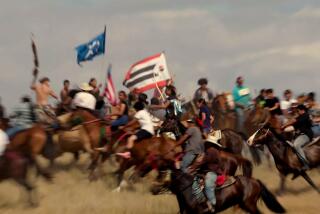TV Reviews : ‘Skylark’--Another Effective Tale of the Pioneer Plains
- Share via
Two years ago this week, a quiet pioneer story about a mail-order bride, “Sarah, Plain and Tall,” registered huge ratings for CBS and wound up the most-watched television movie of the 1990-91 season. A “Sarah” sequel was therefore almost a given.
In the “Hallmark Hall of Fame” presentation “Skylark” (at 9 p.m. Sunday on CBS, Channels 2 and 8), Glenn Close and Christopher Walken reprise their roles as Sarah and Jacob Witting, whom we encounter two years later struggling with a devastating drought on the rippling, sod-buster plains of Kansas.
Writer Patricia MacLachlan, extending the love story she first explored in “Sarah, Plain and Tall,” once again catches the stillness and tremulous lives of ordinary people coping with the havoc of nature on a remote landscape. Their odyssey, at once simple and evocative, heavy on characterization and short on plot, is inviting because it plumbs our heartland in a warm, myth-making way.
Like “Sarah, Plain and Tall,” endurance is the theme, both in the developing bond between Sarah and Jacob and the love-hate relationship with the land. But, unlike the first movie, which dealt heavily with Jacob’s two young children (the delightful Lexi Randall and Christopher Bell are happily back again), “Skylark” deepens the adult love story.
What makes these people refreshing in light of the endemic jabbering by most characters on TV is that they don’t say much. Still close-ups, not verbiage, underscore the rapport. Walken communicates almost entirely through his eyes, and Close, as a woman who fled Maine in answer to an ad for a bride in a newspaper, is equally taciturn while beaming radiant love.
Mercifully, for a story also rich in children and animals (the family mutts are so fetching that you want to go out to buy yourself a dog), producer-director Joseph Sargent keeps taut control, escaping the trap of sentimentality.
But the expanse of rolling green fields that were almost painterly in “Sarah” have turned brown and yellow and crackly in “Skylark,” which cinematographer Michael Fash once again films with moody, resonant colors.
The old swimming holes have dried up, and striking shots of lightening split the black sky. One jagged bolt touches off a horrendous barn fire, sending horses fleeing as Jacob and Sarah futilely try to douse the flames with pails of water.
That’s about it for physical action. No one gets sick, no one dies, no rival rancher shows up with leering, gun-toting henchmen, no one bullies or intimidates anyone else. Instead we glimpse ordinary life circa 1910, with the dawn of the gas buggy, the community picnic and a man and a woman, Jacob and Sarah, who finally succumb to a temporary parting because the earth is too scorched for both of them to survive on it.
She returns, with his kids in tow, to the blessedly wet Maine seashore she left behind, and here the movie takes on a kind of “Howards End” ambience--with a gorgeous family house draped in marigolds and sunflowers and a lovely set of jocular aunts and uncles almost too good to behold.
Juxtaposing the waterscapes of Maine with Jacob waiting for rain on his Kansas plain, the movie artfully pulls together its opposite poles, drawing them ever tighter until the inevitable and only ending this movie could have.
Repeating her role as co-executive producer (with William Self), Close has touched on a yarn rooted in Americana and very much echoing another saga of the Plains, Willa Cather’s great Nebraska novel, “O Pioneers!”
More to Read
The complete guide to home viewing
Get Screen Gab for everything about the TV shows and streaming movies everyone’s talking about.
You may occasionally receive promotional content from the Los Angeles Times.






